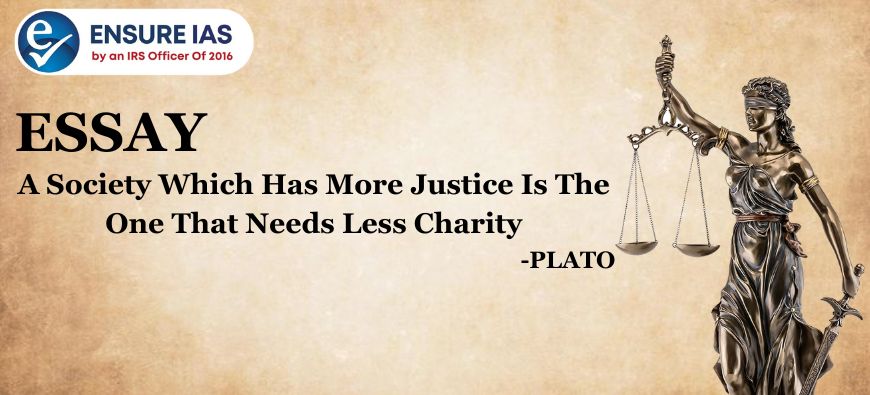- Courses
- GS Full Course 1 Year
- GS Full Course 2 Year
- GS Full Course 3 Year
- GS Full Course Till Selection
- Answer Alpha: Mains 2025 Mentorship
- MEP (Mains Enrichment Programme) Data, Facts
- Essay Target – 150+ Marks
- Online Program
- GS Recorded Course
- Polity
- Geography
- Economy
- Ancient, Medieval and Art & Culture AMAC
- Modern India, Post Independence & World History
- Environment
- Governance
- Science & Technology
- International Relations and Internal Security
- Disaster Management
- Ethics
- NCERT Current Affairs
- Indian Society and Social Issue
- NCERT- Science and Technology
- NCERT - Geography
- NCERT - Ancient History
- NCERT- World History
- NCERT Modern History
- CSAT
- 5 LAYERED ARJUNA Mentorship
- Public Administration Optional
- ABOUT US
- OUR TOPPERS
- TEST SERIES
- FREE STUDY MATERIAL
- VIDEOS
- CONTACT US
A Society Which Has More Justice Is The One That Needs Less Charity
A Society Which Has More Justice Is The One That Needs Less Charity

“True charity consists in helping others to help themselves,” – Franklin D. Roosevelt
In a quiet village surrounded by hills and forests, there was man named Suresh who was known for his unwavering kindness. He was always helping out folks who were struggling, giving them food, clothes, and whatever else they needed. Everyone loved him for it, but he started to wonder why so many people in his village needed help in the first place.
Why were there families who didn't have enough to eat, kids who couldn't go to school, and old folks who couldn't get the medical care they needed? Thinking about it made him realize something important: if everyone got a fair shake, they wouldn't need as much charity.
This story about Suresh is where we're going to start talking about why a just society wouldn't need as much charity.
Looking back through history, the idea of fairness and equality (aka justice) has been important in shaping the way societies work. Ancient civilizations like Greece and Rome were all about justice, seeing it as the key to a successful and stable society. They made laws to ensure everyone was treated fairly and tried to level the playing field.
A big moment for justice was the Magna Carta in 1215. It put limits on the king's power and set the stage for individual rights. In the Indian context, the introduction of the Indian Constitution in 1950 was a landmark moment. Dr. B.R. Ambedkar, the principal architect of the Constitution, wanted to get rid of things like untouchability and make sure everyone had equal rights.
But even with all this progress, we still have a lot of charity around, which shows that while we've been aiming for justice, we haven't always hit the mark.
Socially, the fabric of a just society is woven with the threads of equality and fairness. When individuals have access to the same opportunities, regardless of their background, the need for charity goes down. Education is a prime example. In societies where education is accessible to all, regardless of socioeconomic status, individuals are empowered to lift themselves out of poverty. The Nordic countries, known for their comprehensive welfare states and equitable education systems, demonstrate lower levels of poverty and, consequently, less reliance on charity. In India, the Right to Education Act (RTE) of 2009 mandates free and compulsory education for children aged 6 to 14. This law aims to bridge the educational divide and has significantly increased enrollment rates. However, disparities in educational quality and resources still exist, indicating that further progress is needed to achieve true educational justice.
Politically, the establishment of just policies is essential for reducing dependency on charity. Governments that prioritize social welfare, healthcare, and equitable economic policies create environments where citizens can thrive independently. Policies like progressive taxation and social security nets ensure that wealth is redistributed in a way that supports the underprivileged. The introduction of Universal Healthcare in countries like Canada and the United Kingdom has significantly reduced the need for charitable healthcare services, illustrating how political justice translates to reduced dependency on charity. In India, the Mahatma Gandhi National Rural Employment Guarantee Act (MGNREGA) guarantees 100 days of wage employment per year to rural households. This policy aims to enhance livelihood security and reduce poverty. While it has provided economic relief to millions, gaps in implementation and delays in wage payments highlight the ongoing challenges in achieving political justice.
On an international level, justice plays a crucial role in addressing global inequalities. International bodies like the United Nations work towards establishing justice across nations through human rights declarations and sustainable development goals. When countries implement policies that promote justice, such as fairtrade practices and poverty reduction programs, the reliance on international charity diminishes. The success of microfinance initiatives in countries like Bangladesh, led by organizations such as Grameen Bank, demonstrates how financial justice empowers individuals, reducing the need for charitable interventions. In India, the Self-Help Group (SHG) movement, particularly through organizations like the National Bank for Agriculture and Rural Development (NABARD), has empowered millions of women by providing microloans and fostering financial independence. This initiative has significantly reduced dependence on charity by promoting economic self-sufficiency.
Economically, a just society ensures that wealth is distributed more evenly, reducing the gap between the rich and the poor. Economic justice involves fair wages, labor rights, and access to resources. In economies where minimum wage laws are enforced and workers' rights are protected, there is less economic disparity and, consequently, less need for charity. The concept of a living wage, which ensures that workers earn enough to meet their basic needs, is a step towards economic justice that diminishes the need for charitable support. In India, the implementation of the Goods and Services Tax (GST) aimed to create a unified tax structure, simplifying taxation and potentially increasing revenue for social welfare programs. However, the informal sector still faces challenges, and ensuring fair wages and working conditions remains a critical issue for achieving economic justice.
Environmentally, justice entails ensuring that all individuals have access to clean air, water, and a healthy environment. Environmental justice addresses the disproportionate impact of environmental degradation on marginalized communities. When environmental policies are just, ensuring that industries adhere to regulations that protect natural resources and public health, communities are less likely to suffer from conditions that necessitate charity. For example, enforcing clean water standards reduces the incidence of diseases in low-income communities, thereby reducing the need for charitable health interventions. In India, the Swachh Bharat Abhiyan launched in 2014 aimed to eliminate open defecation and improve solid waste management. This initiative has had significant health and environmental benefits, particularly in rural areas, although continuous efforts are needed to achieve comprehensive environmental justice.
Ethically, the notion of justice is deeply rooted in the principle of fairness. A society that upholds ethical standards of justice treats all its members with dignity and respect, ensuring that their basic needs are met. Ethical justice involves addressing systemic inequalities and providing everyone with the opportunity to succeed. When ethical principles guide societal structures, the disparities that often require charitable interventions are minimized. For instance, ethical labor practices that prevent exploitation ensure that workers receive fair wages, reducing their need for charity. In India, the Corporate Social Responsibility (CSR) mandate requires large companies to spend a portion of their profits on social welfare activities. While this has led to numerous charitable projects, integrating ethical practices into the core operations of businesses would address systemic issues more effectively than charity alone.
Data substantiates these arguments. Studies have shown that countries with higher levels of social justice have lower levels of poverty and inequality. The Social Justice Index, which measures the performance of countries in achieving justice, indicates that nations with strong social justice policies have lower poverty rates and less reliance on charity. For example, according to the Bertelsmann Stiftung’s Social Justice Index, Scandinavian countries consistently rank high in social justice metrics and exhibit lower levels of poverty and social exclusion, correlating with reduced dependence on charitable organizations. In India, the Multidimensional Poverty Index (MPI) developed by the United Nations Development Programme (UNDP) and the Oxford Poverty and Human Development Initiative (OPHI) measures various deprivations that people face. Recent data indicates a decline in multidimensional poverty in India, suggesting progress towards a more just society, though challenges remain.
Returning to Suresh’s village, we can see the parallels. If the village ensured that every child received a quality education, every worker earned a fair wage, and every elder had access to healthcare, the need for Suresh’s charitable efforts would diminish. This doesn’t undermine the value of charity but highlights that charity often addresses symptoms rather than root causes. A society that proactively ensures justice for all its members lays the foundation for a more equitable and self-sufficient community.
In Conclusion, the story of Suresh and his village exemplifies the broader argument that a just society needs less charity. By addressing historical injustices, implementing fair social and political policies, promoting international justice, ensuring economic equity, safeguarding environmental health, and upholding ethical standards, societies can create conditions where charity becomes less necessary. Looking towards the future, we must advocate for national unity and international harmony, fostering sustainable growth that benefits all members of society. This holistic approach not only alleviates immediate needs but also builds a foundation for long-term prosperity and justice. As Swami Vivekananda wisely said, "So long as the millions live in hunger and ignorance, I hold every man a traitor who, having been educated at their expense, pays not the least heed to them" (‘‘जब तक लाखों लोग भूख और अज्ञानता में रहते हैं, तब तक मैं हर उस हर व्यक्ति को देशद्रोही मानता हूं, जो उनका शोषण कर उनके खर्चे पर शिक्षित होने के बावजूद भी उन पर तनिक भी ध्यान नहीं देता है।‘‘) By striving for justice, we can create a society where charity is no longer a necessity but a choice, ensuring dignity and equality for all.
Must Check: Best IAS Coaching In Delhi
Mathematics is the Music of Reason" (MAINS 2024)
The Price of Procrastination: Fulfilling Today’s Duties for a Better Tomorrow

